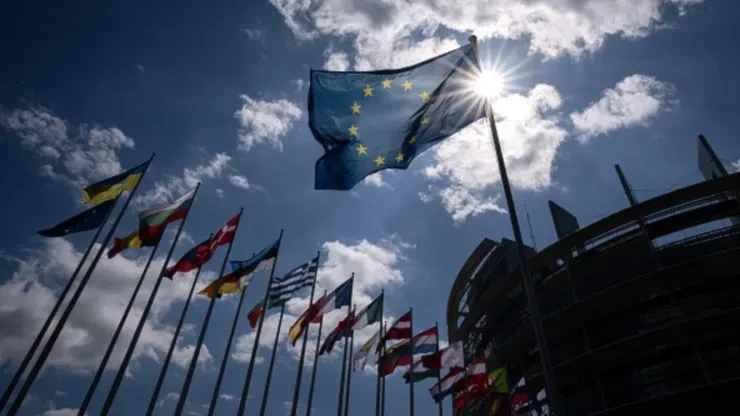EU voters cast ballots on final day of marathon elections
Over 360 million people have been eligible to vote across the EU's 27 member states in the elections that began on Thursday.
-

This photograph shows European countries’ flags waving in front of the European Parliament building in Strasbourg, eastern France, on June 6, 2024. (AFP via Getty Images)
Voters throughout Europe participated on Sunday in the final and most significant day of elections for the EU Parliament, with far-right parties anticipated to gain ground during this critical period for the bloc.
Polling stations opened in 21 member nations, including major players like France and Germany, for a vote that will influence the European Union's trajectory over the next five years.
"These elections are crucial because the European Parliament must start to play its rightful role," Kostas Karagiannis said, as quoted by AFP, as he emerged from a polling station in Athens.
The election is taking place as Europe faces multiple challenges, including the war in Ukraine, global trade and industrial tensions fueled by the US rivalry with China, a climate crisis, and the potential need to adapt to a new Donald Trump presidency within months.
Over 360 million people were eligible to vote across the EU's 27 member states in the elections that began on Thursday, though turnout is expected to be low.
The results will shape the composition of the next EU Parliament, which plays a role in deciding the leadership of the influential European Commission.
It is worth noting that German conservative Ursula von der Leyen is seeking a second term as its head.
Although centrist mainstream parties are expected to secure most of the 720 seats in the incoming European Parliament, polls indicate they may be weakened by a stronger far-right faction pushing the EU toward ultra-conservatism.
Preliminary results are anticipated on Sunday evening. Many European voters, burdened by the high cost of living and attributing social problems to immigrants, are increasingly swayed by populist rhetoric.
Hungarian voter Ferenc Hamori, 54, expressed a desire for the EU to be led by politicians similar to his nation's right-wing Prime Minister Viktor Orban, although he expected Orban to remain "outnumbered in Brussels."
France: Key battleground in EU elections
France is set to be the EU's prominent battleground for competing ideologies. With voting intentions exceeding 30 percent, Marine Le Pen's far-right National Rally (RN) is projected to decisively defeat President Emmanuel Macron's liberal Renaissance party, which is polling at 14-16 percent.
In Lyon, 83-year-old Albert Coulaudon expressed concern that Macron was getting "mixed up" in too many international issues.
In Germany, Europe's largest economy, the election could similarly pose a challenge to Chancellor Olaf Scholz, as his center-left SPD is trailing behind the far-right Alternative for Germany (AfD). The center-right Christian Democrats lead the polls with 30 percent of the votes, while the AfD, at 14 percent, is either tied or ahead of all three parties in the ruling coalition: SPD, Greens, and the liberal FDP.
Le Pen has extended an olive branch to Italy's far-right Prime Minister Giorgia Meloni, aiming to ally. However, Meloni, despite her strong stance against asylum-seekers, has maintained a pro-EU position and has not publicly responded to Le Pen's overture.
Von der Leyen's Ambition
Unlike Le Pen, Meloni aligns with the broader EU stance on sustaining military and financial support for Ukraine and supports its aspiration to eventually join the bloc. Meloni also plays a crucial role in von der Leyen's pursuit of a second term as European Commission chief, a decision made by EU leaders but requiring majority approval in the new European Parliament.
Von der Leyen has signaled openness to her European People's Party (EPP)—expected to lead in the EU Parliament but fall short of a majority—collaborating with Meloni's far-right legislators. Mainstream leftist parties fear this could lead to a significant rightward shift, with stricter immigration policies and a dilution of climate initiatives. It could also further integrate the far-right into the mainstream, as seen in Italy and the Netherlands, where they are prominent in governing coalitions.
Read next: European Parliament elections: Political landscape, key players

 4 Min Read
4 Min Read










